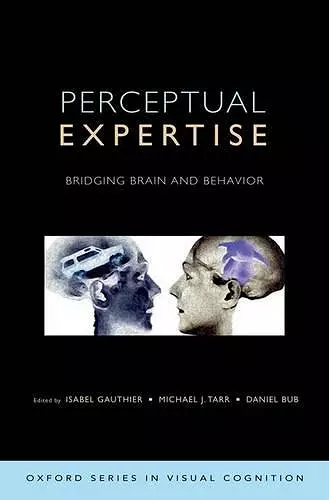Perceptual Expertise
Bridging Brain and Behavior
Isabel Gauthier author Michael Tarr author Daniel Bub author
Format:Hardback
Publisher:Oxford University Press Inc
Published:4th Feb '10
Currently unavailable, and unfortunately no date known when it will be back

This book presents a comprehensive survey of perceptual expertise in visual object recognition, and introduces a novel collaborative model, codified as the "Perceptual Expertise Network" (PEN). This unique group effort is focused on delineating the domain-general principles of high-level visual learning that can account for how different object categories are processed and come to be associated with spatially localized activity in the primate brain. PEN's approach brings together different traditions and techniques to address questions such as how expertise develops, whether there are different kinds of experts, whether some disorders such as autism or prosopagnosia can be understood as a lack or loss of expertise, and how conceptual and perceptual information interact when experts recognize and categorize objects. The research and results that have been generated by these questions are presented here, along with a variety of other questions, background information, and extant issues that have emerged from recent studies, making this book a complete overview on the topic.
This volume is an excellent summary of the views expressed in independent journal articles by the Perceptual Expertise Network group. Whether one agrees with them or not, these views influenced the theory of visual perception and challenged the veracity of widely accepted brain mechanisms accounting for the human ability to easily distinguish between exemplars of visually homogeneous categories such as individual faces. It is a pleasure to read, a must for scholars interested in visual object recognition. * Shlomo Bentin, Professor, Department of Psychology and Center for Neural Computation, Hebrew University of Jerusalem *
Why are humans so much better than machines at seeing, thinking, and acting? Because, unlike machines, we aren't hard-wired, but develop expertise over a lifetime of experience. This volume represents the current state of the art in scientific understanding of how learning hones perception and categorization. This sweeping survey provides deep insights into how perceptual expertise is acquired and lost, ranging from infant development and patient studies, to modelling and brain imaging. At the same time, it is also a refreshingly personal testimony to how scientific collaboration can advance our understanding of fascinating questions in cognitive neuroscience. * Heinrich H. Bülthoff, Director, Department of Human Perception, Cognition, and Action, Max Planck Institute for Biological Cybernetics *
How does expertise come to be represented in the posterior part of the human brain? This beautifully crafted volume combines cognitive, patient, fMRI, ERP and developmental studies done by the world's leading researchers to summarize the state of the art on the nature and localization of expertise. It will be a major tool for researchers interested in the learning of human skills. * Michael Posner, Professor Emeritus, Department of Psychology, Institute of Cognitive and Decision Sciences, University of Oregon *
In true interdisciplinary fashion, this ambitious book represents the efforts of developmental and cognitive psychologists, computer scientists, neuroscientists, and neuropsychologists who have come together to unravel the secrets of how neurotypical infants, children and adults, as well as individuals with autism and prosopagnosia, learn about their visual world. * Charles A. Nelson III, Professor of Pediatrics, Psychiatry and Neuroscience, Harvard Medical School *
ISBN: 9780195309607
Dimensions: 160mm x 236mm x 31mm
Weight: 732g
416 pages